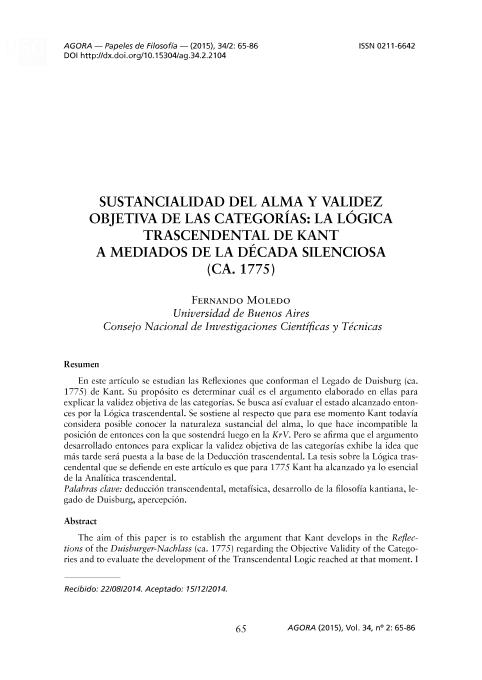Mostrar el registro sencillo del ítem
dc.contributor.author
Moledo, Fernando

dc.date.available
2018-07-05T16:59:56Z
dc.date.issued
2015-05
dc.identifier.citation
Moledo, Fernando; Sustancialidad del alma y validez objetiva de las categorías: la Lógica trascendental de Kant a mediados de la década silenciosa (ca. 1775); Universidade de Santiago de Compostela. Facultad de Filosofía; Ágora; 34; 2; 5-2015; 65-86
dc.identifier.issn
2174-3347
dc.identifier.uri
http://hdl.handle.net/11336/51363
dc.description.abstract
En este artículo se estudian las Reflexiones que conforman el Legado de Duisburg (ca. 1775) de Kant. Su propósito es determinar cuál es el argumento elaborado en ellas para explicar la validez objetiva de las categorías. Se busca así evaluar el estado alcanzado entonces por la Lógica trascendental. Se sostiene al respecto que para ese momento Kant todavía considera posible conocer la naturaleza sustancial del alma, lo que hace incompatible la posición de entonces con la que sostendrá luego en la KrV. Pero se afirma que el argumento desarrollado entonces para explicar la validez objetiva de las categorías exhibe la idea que más tarde será puesta a la base de la Deducción trascendental. La tesis sobre la Lógica trascendental que se defiende en este artículo es que para 1775 Kant ha alcanzado ya lo esencial de la Analítica trascendental.
dc.description.abstract
The aim of this paper is to establish the argument that Kant develops in the Reflections of the Duisburger-Nachlass (ca. 1775) regarding the Objective Validity of the Categories and to evaluate the development of the Transcendental Logic reached at that moment. I claim that at this point Kant still considers the possibility of knowing the Substantiality of the Soul, making impossible the identification of the development of the Transcendental Logic reached by the middle 1770 with that of the KrV. Nevertheless I argue that the argument that Kant develops in Reflections of the Year 1775 rests upon the fundamental idea that Kant will later place at the basis of the Transcendental Deduction of the Categories in the KrV. The main claim of this paper about the development of the Transcendental Logic is that by the middle 1770 Kant had already reached the essential ideas of the first part of the Transcendental Logic: The Transcendental Analytic.
dc.format
application/pdf
dc.language.iso
spa
dc.publisher
Universidade de Santiago de Compostela. Facultad de Filosofía
dc.rights
info:eu-repo/semantics/openAccess
dc.rights.uri
https://creativecommons.org/licenses/by-nc-sa/2.5/ar/
dc.subject
Kant
dc.subject
Categorías
dc.subject
Sustancialidad
dc.subject
Alma
dc.subject
Deducción Trascendental
dc.subject
Metafísica
dc.subject
Apercepción
dc.subject.classification
Estudios Religiosos

dc.subject.classification
Filosofía, Ética y Religión

dc.subject.classification
HUMANIDADES

dc.title
Sustancialidad del alma y validez objetiva de las categorías: la Lógica trascendental de Kant a mediados de la década silenciosa (ca. 1775)
dc.title
Substantiality of the Soul and Objective Validity of the Categories: Kant’s Transcendental Logic in the Middle of the Silent Decade (ca. 1775)
dc.type
info:eu-repo/semantics/article
dc.type
info:ar-repo/semantics/artículo
dc.type
info:eu-repo/semantics/publishedVersion
dc.date.updated
2018-07-05T13:38:06Z
dc.journal.volume
34
dc.journal.number
2
dc.journal.pagination
65-86
dc.journal.pais
España

dc.journal.ciudad
Santiago de Compostela
dc.description.fil
Fil: Moledo, Fernando. Consejo Nacional de Investigaciones Científicas y Técnicas; Argentina. Universidad de Buenos Aires. Facultad de Filosofía y Letras. Instituto de Filosofía ; Argentina
dc.journal.title
Ágora
dc.relation.alternativeid
info:eu-repo/semantics/altIdentifier/url/www.usc.es/revistas/index.php/agora/article/view/2104
dc.relation.alternativeid
info:eu-repo/semantics/altIdentifier/url/https://dialnet.unirioja.es/servlet/articulo?codigo=5100430
dc.relation.alternativeid
info:eu-repo/semantics/altIdentifier/doi/http://dx.doi.org/10.15304/ag.34.2.2104
Archivos asociados
